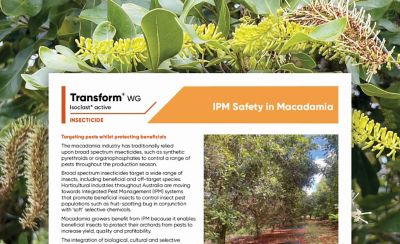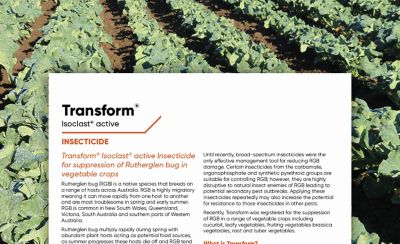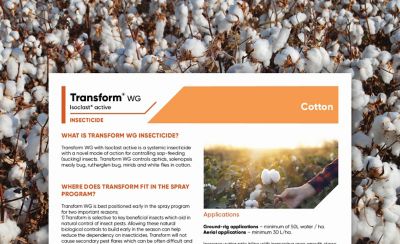
The registration of Transform® Isoclast active insecticide, as an early season pest control option in Macadamias has helped enable growers to integrate Pest Management (IPM) techniques throughout the growing season.
Transform is now registered for the control of Macadamia Lace bugs (MLB), adding further value when used to control fruit spotting bug and banana spotting bug.
MLB is a small sap-feeding insect which attacks flower buds at early nutset stage. MLB feed directly on flower racemes, which causes flowers to desiccate resulting in significant crop losses.
Northern NSW Macadamia grower and consultant, Stephen McLean said the crop was important for the area but there was a lot of community scrutiny towards spraying chemicals.
“I think it is always good to be responsible and go the softer options, where you can. It is important to take on new chemistry along with cultural practices and other biological controls you can incorporate," he said.
“I've got a bit of hope for Transform. We've got Lace bug as a big flowering issue for us in the past. We've used things like diazinon as a pre-flower, which is quite effective, but it is a product that is up for review. It is pretty hard on beneficials as well and it is not really nice for the user.”

Mr Annetts said Lace bug was an important pest and attacks early in flowering with the potential to completely take the yield.
Corteva Agriscience Horticultural Manager, Nick Koch, said the new pest on the Transform label complemented the existing pests of fruit spotting bug and banana spotting bug.
“One of the most positive attributes of Transform is its selectivity to key beneficial insects.”
“The natural biological controls that exist in the orchard are conserved because Transform selectively controls the pests whilst preserving beneficial insects.”
“Biological control can help to keep invasive pests underneath the economic thresholds which in turn can reduce the dependency on insecticides.”
He said the three key pests on the label can all be very damaging early in the season and Transform presents an excellent option.
“We can also tie in our other portfolio offerings such as Prodigy, which is a highly selective insecticide for chewing pests particularly flower caterpillar and nut borer and Success Neo for thrips.”
“Growers can manage a season long IPM program where there is a interdependence on biological controls supported by cultural controls and careful management of selective chemical controls."
“Growers are investing significantly in IPM and introducing biological controls to the orchard. Beneficial insects such as trichogamma, a parasitic wasp that lays its eggs into macadamia nutborer work tirelessly for the farmer keeping the nutborers under control, the last thing a grower wants is to use is a broad-spectrum insecticide.”
“Transform has a fantastic fit early on in the season because it enables an Integrated Pest Management program to be successfully implemented in the orchard.”
Mr Koch said an important aspect of all chemicals was to maximise spray coverage through the canopy.
“A lot of the new chemistry coming to market is highly selective and very targeted,” he said. “We need to be able to deliver the chemistry to where it is needed for it to work effectively.”
Additional Resources

Transform WG IPM safety in Macadamias
The macadamia industry has traditionally relied upon broad spectrum insecticides, such as synthetic pyrethroids or organophosphates to control a range of pests throughout the production season.
View now
Suppression of Rutherglen bugs in Vegetables
Rutherglen bug (RGB) is a native species that breeds on a range of hosts across Australia. RGB is highly migratory meaning it can move rapidly from one host to another and are most troublesome in spring and early summer.
View now
Transform WG - Cotton Tech note
Transform WG with Isoclast active is a systemic insecticide with a novel mode of action for controlling sap-feeding insects. Transform WG controls aphids, solenopsis mealy bug, rutherglen bug, mirids and white flies in cotton.
View now